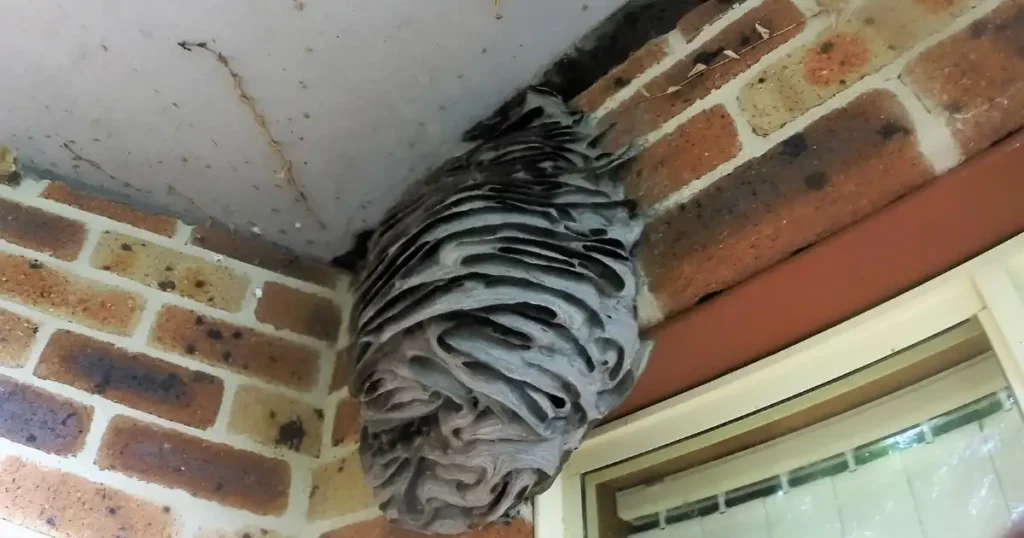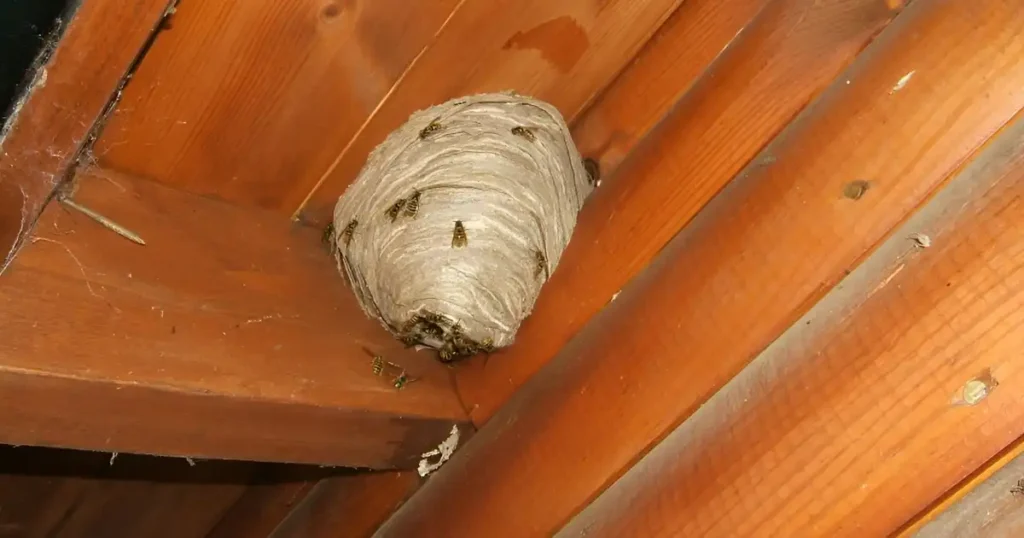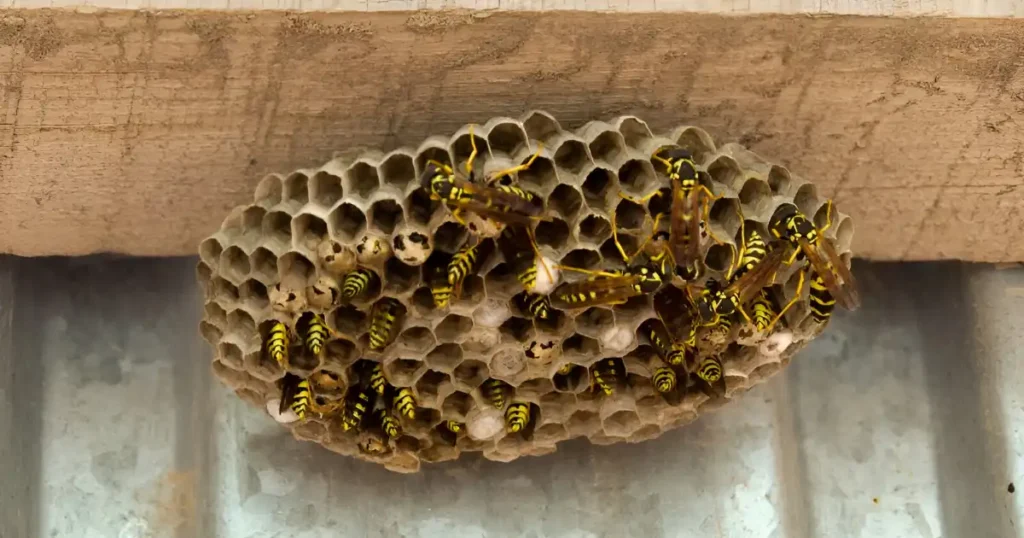
In summer, it’s not uncommon to see wasps, and while they play an important role in pollination, they can also be a nuisance when you find one of their nests in or around your home. Not only can their stings be painful, but their presence can also be a source of anxiety for those who are allergic. Therefore, it's important to know how to prevent the building of wasps’ nests on your property.
To prevent wasps from building nests, it’s crucial to eliminate potential nesting sites. Wasps are attracted to sheltered areas that are protected from the weather, so it's important to block all cracks or gaps in your home's exterior. This includes holes in your roof, walls, and foundation, as well as gaps around windows and doors. You should also clear your gutters and downspouts of debris, as wasps may also build nests in these areas.
Another way to deter wasps from building nests is to remove potential food sources. Keep your outdoor eating areas clean and free of spills, as wasps are attracted to sweet smells. Additionally, make sure to tightly seal your trash cans and remove any fallen fruit from your yard. Eliminating potential food sources is a good way to reduce the likelihood of wasps building nests in your vicinity.

Wasps build nests for the colonies that they live in, as they are social insects. Understanding their behavior is essential to prevent them from building nests around your home.
Wasps build nests in the spring and summer months, and their nests can grow to be quite large. Protected areas, such as under eaves, in attics, and in trees, are places where wasps usually build their nests.
Different species of wasps build nests of different sizes and shapes. Some wasps build paper-like nests, while others build nests out of mud. Keep in mind that if wasps feel their nest is threatened they can become aggressive, so it is best to avoid disturbing their nests.
To prevent wasps from building nests, it is essential to identify common nesting sites. The type of spaces preferred by wasps for their nests are protected areas that are close to a food source. Some common wasp nesting sites are:
By identifying these common nesting sites, you can take steps to prevent wasps from building nests in these areas. For example, sealing up cracks and crevices around the home can prevent wasps from entering and building nests in attics and crawl spaces. Additionally, removing fallen logs and stumps from your yard can eliminate potential nesting sites.
In conclusion, understanding wasp behavior is essential to prevent them from building nests around your home. By identifying common nesting sites and taking steps to prevent wasps from building nests in these areas, you can keep your home and family safe from these stinging insects.
Wasps are a common problem during the summer months, and their nests can be a nuisance for homeowners. This section will deal with a few good practices you can apply to your home to keep wasps from building nests.
To keep wasps away from your home, you can use natural repellents. These include:
A good way to keep wasps from building nests around your home is physical barriers. These include:
Maintaining a clean environment is key to keeping wasps away from your home. Here are some tips:
By following these tips, you may be able to keep wasps from building nests around your home.
Making some modifications to the home can be a good way to keep wasps from building nests. The following are some ways you can prevent wasps’ nest building under eaves or in vents.
By making these simple home modifications, you may be able to prevent wasps from building nests under eaves or in vents.

Other solutions may be more effective in preventing wasps from building nests around your home. The two main options for more effective solutions are chemical insecticides and wildlife removal professionals.
Insecticides are chemical sprays that can be purchased at most hardware or home improvement stores. When using insecticides, following the instructions carefully to ensure proper use and safety is crucial. Insecticides can be sprayed directly on areas where wasps are building nests, such as under eaves or in corners of buildings. Insecticides can also be used preventatively by spraying areas where wasps are likely to build nests before they start building.
Keep in mind that insecticides can be harmful to other insects and animals, so it is important to use them responsibly and only when necessary. It is also important to consider the environmental impact of using insecticides and to look for eco-friendly options if possible.
If you are dealing with a large infestation or are uncomfortable using insecticides yourself, professional pest control may be a better option. Wildlife removal companies like CritterStop will remove wasp nests from your property safely and effectively.
When hiring a wildlife removal company, it is important to choose a reputable and experienced company. Look for companies that use eco-friendly options when possible and that prioritize safety for both humans and animals.
Chemical solutions can be a good way to prevent wasps from building nests around your home but should be used responsibly and with consideration for the environmental impact. On the other hand, hiring wildlife removal professionals is a safer and more effective way of removing a wasp colony from your property.
No one wants wasps to build their nests in their residence. Removing these nests can be dangerous, so it is important to take the proper precautions. This section will go over ways you can get rid of wasp nests safely and effectively.
Your safest bet is to call a professional wildlife removal company, especially If the wasp nest is located in a hard-to-reach area or if you are allergic to wasp stings. The proper equipment and training that these companies possess allow them to safely remove the nest.
You must also call a professional in case you have tried to remove the nest yourself and the wasps have become aggressive. Without the proper equipment and the knowledge of how to remove the nest safely, it can be very dangerous to do it yourself.
By contacting a wildlife professional, you can safely, effectively, and permanently get rid of wasps’ nests on your porch or elsewhere on your property.
If you have a wasp nest on your porch or elsewhere on your property, approaching it with caution is crucial. Wasps can become aggressive if they feel threatened, so it is best to wear protective clothing such as gloves, pants, long sleeves, and a hat. It’s also better to work at times when the wasps are less active, such as during the night.
Some homeowners use a commercial insecticide spray to remove wasps’ nests. These sprays can be applied directly into the nest and are designed to kill the wasps on contact. However, they are not a guaranteed solution and it is important to follow the instructions carefully and to use the spray from a safe distance.
Natural insecticides, such as peppermint oil or vinegar, are another option. These substances can be mixed with water and sprayed onto the nest. However, it is important to note that natural insecticides may not be very effective.
These are some steps you can follow to attempt to remove a wasps’ nest yourself, but keep in mind that you should hire a wildlife professional if you want an effective and definitive solution. Remember to always approach wasp nests with caution and to take the proper precautions to avoid getting stung.

Regular maintenance is key in preventing wasps from building nests in and around your home. Here are some tips to help keep wasps at bay:
Performing routine inspections of your property can help you identify potential nesting sites and take action before a nest is built. Check for any cracks or holes in your home's exterior, as well as any gaps in your windows or doors. Wasps can also build nests in trees, bushes, and other outdoor structures, so be sure to inspect these areas as well.
Keeping your garden and yard well-maintained can help prevent wasps from building nests. Keeping your lawn mowed and free of debris and trimming back any overgrown bushes or trees are good practices. You can also avoid leaving open containers of food or drinks outside, as wasps are attracted to sweet smells. Additionally, consider using wasp-repelling plants such as mint, eucalyptus, and citronella in your garden.
Combining these steps with regular maintenance on your property, you may be able to stop wasps from nesting and keep your home and yard free of these pests.

Before learning how to stop wasps from building nests, it is important to understand the different species and behaviors of wasps. Worldwide, there are about 30,000 species of wasps, but the most common types are paper wasps, yellow jackets, and hornets.
Paper wasps are generally non-aggressive and build small, open nests that resemble an umbrella. Known to be more aggressive, yellow jackets build their nests in underground burrows or void spaces in buildings. Hornets are the largest of the three and build their nests in trees or shrubs.
As natural predators of other insects, wasps are beneficial to the ecosystem as they control the population of harmful pests, such as caterpillars and flies.
Wasps play an important role in the ecosystem as natural pest control agents. They help control the population of other insects, which can cause damage to crops and gardens. Wasps are also important pollinators, helping to fertilize plants and flowers.
However, it is important to keep wasps from building nests in areas where they can pose a threat to humans. You can do this through particular preventative measures, such as sealing cracks and crevices in buildings, removing sources of food and water, and using traps or repellents.
By understanding the behaviors and benefits of wasps, it is possible to coexist with them safely and beneficially.
It’s good to take precautions in your home so that wasps don’t make it theirs too, and there’s many things you can do to make sure of that. However, taking care of an already-built nest is a lot more challenging and riskier. If that’s the case for you, CritterStop can help you get rid of that pesky nest quickly for good, as we offer industry-leading guarantees. Contact Us or call us at (214) 234-2616 today for a free inspection and estimate.
Sealing off potential entry points, such as cracks or gaps in windows and doors, is a good idea. Additionally, removing any sources of food, such as fallen fruit or sugary drinks, can discourage wasps from entering the area.
Some natural deterrents include planting mint or eucalyptus around the home, as wasps dislike the scent. You can also discourage wasps from building their nests by tricking them into perceiving the area as already occupied by hanging up fake wasp nests.
There are several commercial sprays available that can be used to deter wasps from building nests. These sprays typically contain pyrethrin or peppermint oil, which are known to repel wasps.
Wasps are attracted to areas with a readily available food source, such as fruit trees or outdoor dining areas. To prevent wasps from nesting around the home, it is important to remove any sources of food and keep the area clean and free of debris.
One good method is to hang up fake wasp nests, as this can trick wasps into perceiving the area as already occupied. Additionally, sealing off any potential entry points and removing any sources of food can make the area less attractive to wasps.
Wasps dislike the scent of mint and eucalyptus, so planting these plants around the home can help deter wasps from building nests. Additionally, certain essential oils, such as peppermint oil and citronella oil, are known to repel wasps and can be used in sprays or diffusers to keep them at bay.
Visit our Critter Library and learn more about our furry friends